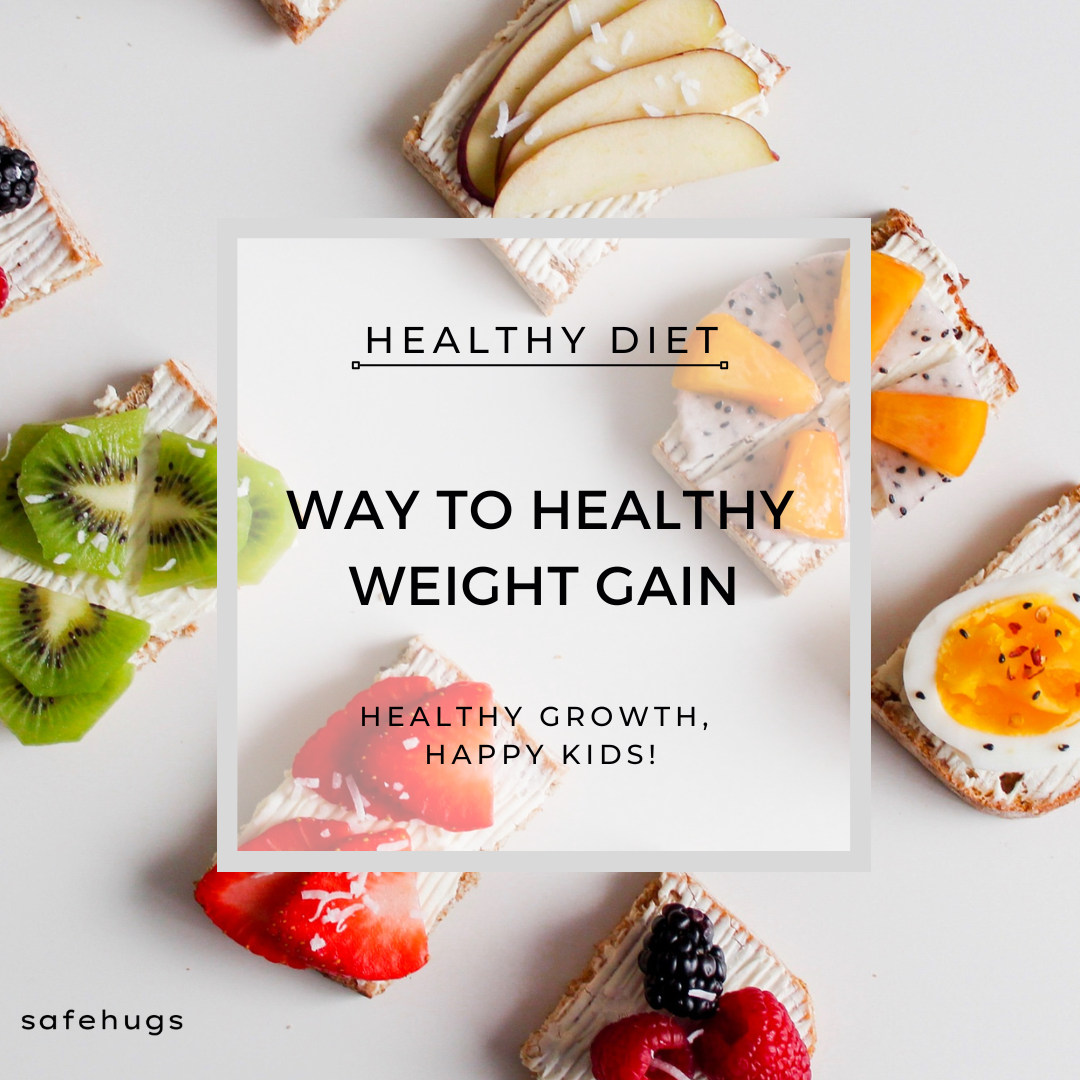Top 25 Healthy Weight Gain Foods for Kids
Table of Contents
As parents, ensuring that our children grow and develop properly is one of our top priorities. However, some children may struggle with gaining weight or maintaining a healthy weight. If you're worried about your child’s growth, it's essential to understand what healthy weight gain looks like and how to support it with healthy weight gain foods for kids. This blog will guide you through understanding underweight concerns, offering helpful food recommendations, and providing tips for incorporating them into your child's diet.
Underweight Child – What is Normal?
It's natural to be concerned if your child seems underweight, but it's important to remember that each child develops at their own pace. A child might be naturally slender or have a higher metabolism, but it doesn't necessarily mean they are unhealthy. The key is to focus on their overall growth and development.
To assess whether your child is underweight, it’s helpful to refer to a growth chart and calculate their Body Mass Index (BMI). BMI is a tool used to determine if a child’s weight is in a healthy range for their age and height. Keep in mind that BMI varies by age and gender, and it's important to consult a healthcare professional for accurate assessments.
Here is the Weight Gain Food Chart and Ideal BMI for kids.


Use this easy BMI calculator to check and guide their growth journey!
25 Nutrient-Rich Foods for Healthy Weight Gain
To promote healthy weight gain foods for kids, it’s essential to focus on nutrient-dense foods that provide both calories and essential vitamins and minerals. Here are 25 foods to consider for a weight gain diet for kids:
-
Avocados
Avocados are packed with healthy fats and calories, making them an excellent choice for promoting weight gain in children. They are also rich in fiber, potassium, and essential vitamins like Vitamin E, which supports immune function and skin health. The monounsaturated fats in avocados contribute to healthy heart development, making them a great addition to your child's diet. Add slices of avocado to sandwiches, smoothies, or salads to boost calories and nutrition.
Nutrients value of 100g of avocado:

-
Whole Milk
Whole milk is packed with healthy fats, protein, and vitamins like Vitamin D and calcium. These nutrients help with bone growth, immune function, and muscle development. Serve it as a drink, in smoothies, or on top of cereals to boost your child’s calorie intake.
Nutrients value of 100g of whole milk:

-
Full-Fat Yogurt
Full-fat yogurt contains probiotics that help with gut health, along with protein, calcium, and healthy fats. It supports muscle and bone growth while being calorie-dense. Choose plain varieties to avoid added sugars, and mix in fruits, nuts, or honey for added taste and nutrients.
Nutrients value of 100g of full fat yogurt:

-
Cheese
Cheese is high in protein, calcium, and healthy fats. It supports muscle and bone growth and is calorie-rich, making it perfect for weight gain. Offer cheese slices, melt it on vegetables, or include it in sandwiches or pasta.
Nutrients value of 100g of cheese:

-
Nut Butters (Peanut Butter, Almond Butter)
Nut butters are packed with protein, healthy fats, and calories. They promote weight gain and are great for boosting your child's energy levels. Spread nut butter on toast, add to smoothies, or pair with fruits for a delicious snack.
Nutrients value of 100g of nut butters:

-
Olive Oil
Olive oil is a heart-healthy source of monounsaturated fats, which promote healthy weight gain. Rich in antioxidants, it supports brain health and cell growth. Add it to salads, use it for cooking, or drizzle over vegetables to increase calorie intake.
Nutrients value of 100g of olive oil:

-
Salmon
Salmon is a great source of omega-3 fatty acids, which support brain health, heart health, and immune function. It’s also high in protein and Vitamin D, which helps with bone strength. Serve salmon grilled, baked, or in soups and salads for a nutrient-packed meal.
Nutrients value of 100g of salmon:

-
Chicken
Chicken is rich in protein, phosphorus, and Vitamin B12, which help with muscle growth, brain development, and overall body function. Choose lean cuts like chicken breasts and avoid skin to reduce saturated fats. It can be added to various dishes like soups, salads, and sandwiches.
Nutrients value of 100g of chicken:

-
Eggs
Eggs are an excellent source of protein, healthy fats, and nutrients like Vitamin D and choline, essential for brain health. They help in muscle building and weight gain. Scramble eggs, serve them boiled, or make an omelet for a nutrient-rich meal.
Nutrients value of 100g of eggs:

-
Sweet Potatoes
Sweet potatoes are loaded with complex carbohydrates, fiber, and essential vitamins like Vitamin A and C. These nutrients support healthy immune function and overall growth. Serve them mashed, roasted, or in stews to help with healthy weight gain.
Nutrients value of 100g of sweet potatoes:

-
Quinoa
Quinoa is a high-protein, gluten-free grain that provides essential amino acids, fiber, and minerals like magnesium and iron. It supports muscle growth and energy production. Quinoa can be used in salads, as a side dish, or in bowls with veggies and protein.
Nutrients value of 100g of quinoa:

-
Oats
Oats provide complex carbohydrates, fiber, and B-vitamins that support overall health and energy levels. They are great for sustaining energy throughout the day. Serve oats as oatmeal, in granola bars, or in baked goods like muffins to increase calories.
Nutrients value of 100g of oats:

-
Bananas
Bananas are rich in potassium, fiber, and carbohydrates, making them an excellent energy source. Their natural sugars provide quick energy and help with digestion. Bananas can be eaten on their own, added to smoothies, or topped on oatmeal.
Nutrients value of 100g of bananas:

-
Dried Fruits (Raisins, Apricots)
Dried fruits are calorie-dense and packed with fiber, potassium, and antioxidants. They provide natural sugars for energy and are a great snack option. Serve dried fruits as a snack, in trail mixes, or added to cereals or oatmeal for extra calories.
Nutrients value of 100g of dried fruits:

-
Coconut Milk
Coconut milk is rich in healthy fats, particularly medium-chain triglycerides (MCTs), which aid in healthy weight gain. It also contains Vitamin C and E for immune support. Use coconut milk in smoothies, soups, or curries to increase calories and nutrients.
Nutrients value of 100g of coconut milk:

-
Full-Fat Cottage Cheese
Cottage cheese is high in protein and calcium, which support muscle and bone growth. The full-fat version provides extra calories, making it a good choice for weight gain. Serve cottage cheese with fruits, in salads, or as a topping on toast.
Nutrients value of 100g of full fat cottage cheese:

-
Beef
Beef is a great source of high-quality protein, iron, zinc, and Vitamin B12, which promote healthy growth and muscle development. It also provides essential nutrients like creatine for energy. Serve lean cuts of beef in stews, grilled, or as part of a healthy stir-fry.
Nutrients value of 100g of beef:

-
Chia Seeds
Chia seeds are high in fiber, healthy fats, and protein. They are rich in omega-3 fatty acids and antioxidants, which promote brain health and overall growth. Add chia seeds to smoothies, yogurt, or sprinkle them on salads for a nutritional boost.
Nutrients value of 100g of chia seeds:

-
Pasta
Pasta is a great source of carbohydrates, providing the energy children need for active days. When paired with protein-rich sauces like cheese, chicken, or meatballs, pasta becomes a high-calorie, nutrient-dense meal that supports weight gain.
Nutrients value of 100g of pasta:

-
Lentils
Lentils are rich in plant-based protein, fiber, and essential vitamins and minerals like iron and folate. They support muscle growth and overall health. Cook lentils in soups, stews, or serve as a side dish to add healthy calories to meals.
Nutrients value of 100g of lentils:

-
Tofu
Tofu is a great source of plant-based protein and contains healthy fats, calcium, and iron. It helps in muscle building and supports weight gain. Tofu can be added to stir-fries, soups, or blended into smoothies to increase protein intake.
Nutrients value of 100g of tofu:

-
Pineapple
Pineapple is rich in vitamin C, manganese, and antioxidants, which support immune function and overall health. Its natural sugars provide energy, and its enzymes aid digestion. Serve pineapple fresh, in smoothies, or as a topping for yogurt or cottage cheese.
Nutrients value of 100g of pineapple:

-
Hummus
Hummus is made from chickpeas, which are high in protein, healthy fats, and fiber. It provides a good amount of calories and is rich in vitamins and minerals like folate and iron. Serve hummus as a dip with vegetables or spread it on sandwiches or crackers for a healthy snack.
Nutrients value of 100g of hummus:

-
Pumpkin Seeds
Pumpkin seeds are rich in protein, healthy fats, and minerals like zinc and magnesium, which are essential for growth and development. They are high in calories, making them a great option for weight gain. Add pumpkin seeds to salads, granola, or eat them as a snack.
Nutrients value of 100g of pumpkin seeds:

-
Dark Chocolate
Dark chocolate with a high percentage of cocoa is rich in antioxidants, iron, and magnesium. It is calorie-dense and provides healthy fats, making it a great treat for children who need to gain weight. Offer small pieces of dark chocolate as a snack or mix it into yogurt or smoothies.
Nutrients value of 100g of dark chocolate:

Easy Recipes and Meal Ideas for Kids
Making healthy foods fun and easy to eat is key to encouraging your child to enjoy them. Here are some meal ideas with an Indian twist:
- Smoothies: Blend full-fat yogurt, ripe bananas, and a spoonful of peanut butter or almond butter for a calorie-packed smoothie. Add a handful of spinach or moringa powder (drumstick leaves) for an extra nutrient boost!
- Avocado Paratha: Mash avocado and mix it with whole-wheat flour, a pinch of salt, and spices like cumin or carom seeds (ajwain) to make soft parathas. Serve with a dollop of ghee for a filling snack.
- Egg Bhurji with Cheese: Make a protein-rich scrambled egg (bhurji) with cheese, onions, tomatoes, and spices like turmeric and garam masala. Add a little butter or ghee for extra richness.
Looking for nutritious and delicious snack ideas for your little ones? Check out our top picks in "Healthy snacks for kids to take to school."
Healthy Eating Habits for Kids

Establishing good food habits for class 2 students or younger children is essential for their long-term health. Here are some tips for fostering healthy eating habits for kids:
- Set regular meal times: Try to have meals and snacks at consistent times each day.
- Make mealtime enjoyable: Turn off screens and enjoy meals together as a family. This can help foster a positive relationship with food.
- Teach portion control: Encourage your child to listen to their hunger cues and serve age-appropriate portions.
By incorporating these habits into their routine, your child can develop a healthy relationship with food and promote balanced growth.
Plan a balanced child diet plan weight gain, and know how to make your kid gain weight in "Healthy weight gain in kids".
Strategies to Make Healthy Foods Appealing for Children
-
Fun Shapes and Presentation: Cut vegetables, fruits, or sandwiches into fun shapes like stars, hearts, or animals using cookie cutters. Creating colorful plates with a variety of fruits and vegetables can make mealtime more exciting.
-
Involve Kids in Cooking: Let children help in the kitchen with simple tasks such as washing vegetables, mixing ingredients, or arranging toppings. When kids take part in meal prep, they’re more likely to enjoy eating the food they've helped create.
-
Flavorful Dips: Pair vegetables like carrots, cucumber, or bell peppers with tasty dips. Homemade yogurt dips, or chutneys like mint or tamarind, can make healthy veggies more fun and appetizing for kids.
-
Bright Colors: Kids are naturally attracted to colorful foods. Use vibrant fruits and vegetables, such as berries, oranges, carrots, and greens, to create a visually appealing and nutrient-packed meal.
-
Mini Versions of Favorite Foods: Prepare smaller portions or bite-sized versions of popular meals. Mini cutlets, smaller wraps, or bite-sized idlis can make eating healthy more fun and easier for kids.
-
Healthy Parathas and Wraps: Include healthy stuffed parathas or wraps made with whole grains and filled with vegetables like spinach, carrots, or sweet potatoes. These can be served with a side of yogurt or a dip to make them more interesting.
-
Smoothies and Smoothie Bowls: Blend fruits like bananas, mangoes, or berries into smoothies. You can add nutritious ingredients like oats, seeds, or even spinach, which won't overpower the taste. Let kids decorate their smoothie bowls with toppings like fruits, seeds, or nuts.
-
Healthy Versions of Popular Snacks: Try baking instead of frying for snacks. Make baked vegetable cutlets, samosas, or even healthy versions of fritters, and serve them with flavorful dips.
-
Sneak in Nutritious Ingredients: Add finely chopped or pureed vegetables to everyday dishes like soups, pasta, rice, or parathas. This is an easy way to increase the nutritional value of meals without altering the taste too much.
- Positive Reinforcement and Fun Mealtimes: Praise kids for trying new healthy foods. Create a reward system or make mealtime a fun, relaxed experience. Engage them with interesting stories about the food they're eating, making them curious to try new things.
Discover helpful parenting tips and advice on the SafeHugs Parenting Blog to guide you through the journey of raising happy, healthy children.
Meal Planning Tips:
For busy parents, meal planning can make it easier to ensure your child gets the nutrition they need. Here are some simple strategies:
-
Plan Ahead: Create a weekly menu that includes a variety of proteins (like legumes, chicken, or tofu), whole grains, and plenty of vegetables. This helps ensure balanced, nutritious meals throughout the week.
-
Batch Cook: Prepare large batches of meals (like soups, stews, or curries) and store them for later. This saves time on busy days and reduces the temptation to order unhealthy takeout.
-
Use Leftovers: Repurpose leftovers into new meals, such as turning extra rice into a stir-fry or leftover vegetables into a soup. This reduces waste and makes cooking easier.
-
Healthy Substitutes: Swap unhealthy ingredients with nutritious alternatives—use whole grains instead of refined flour, yogurt instead of cream, or avocado instead of butter for a healthier version of your favorite dishes.
- Stock Essentials: Keep your pantry stocked with healthy staples like lentils, beans, whole grains, and frozen vegetables. This ensures you always have ingredients on hand to create a quick and nutritious meal.
Common Mistakes to Avoid
When trying to help a child gain weight, there are a few common mistakes to avoid:
- Relying on processed foods:While they may be calorie-dense, processed foods often lack essential nutrients.
- Skipping meals:Skipping meals can cause your child to miss out on valuable calories and nutrients.
- Forcing food:Encourage healthy eating but avoid pressuring your child to eat. This can create negative associations with food.
By avoiding these mistakes, you can help your child develop good weight gain foods for kids habits that promote weight gain in a balanced way.
Supporting your child’s growth and healthy weight gain requires a combination of nutrient-dense foods, healthy eating habits for kids, and thoughtful meal planning. By providing a variety of high-calorie, nutritious options and making mealtime fun and positive, you can help your child achieve their ideal weight in a healthy way. Always consult with a pediatrician or nutritionist to ensure your child’s dietary needs are met and tailored to their specific growth needs.
Related:
- Explore “Importance of Healthy Food Essay for Students”.
- Discover the “Benefits of Healthy Eating in Early Childhood”.
- Explore “Safe and Healthy Weight Loss Strategies for Kids” for weight loss and overall well-being!
- Explore “Healthy Snacks for Kids to Take to School” to discover how to prepare snacks that are both delicious and nutritious.
- Here's a comprehensive weight gain plan “Healthy Weight Gain in Kids”.
FAQ'S
1. Which food is best for weight gain for kids?
For healthy weight gain in Indian kids, focus on calorie-dense foods like ghee, full-fat dairy (milk, curd, paneer), nuts, seeds, eggs, lean meats (chicken, fish), and healthy grains like rice and whole wheat. These foods provide essential nutrients and healthy fats for growth.
2. How do skinny kids gain weight?
Skinny kids can gain weight by eating calorie-rich foods like parathas with ghee, dal with rice, nut butters, banana milkshakes, and including full-fat dairy. Increasing portion sizes and adding healthy snacks like nuts and fruit can also help.
3. What if my 5-year-old is losing weight?
If your 5-year-old is losing weight, consult a pediatrician to rule out any health concerns. In the meantime, offer high-calorie, nutritious meals like khichdi with ghee, milk with nuts, and fruits like mangoes and bananas to boost weight.
4. When to worry about child weight?
You should be concerned if your child is consistently underweight, not gaining weight over time, or showing signs like weakness, lethargy, or difficulty keeping up with other kids. Consult a doctor if you notice any of these signs.
5. Can PediaSure help gain weight?
Yes, PediaSure can support weight gain when paired with a balanced diet. Consult a pediatrician for guidance.
































